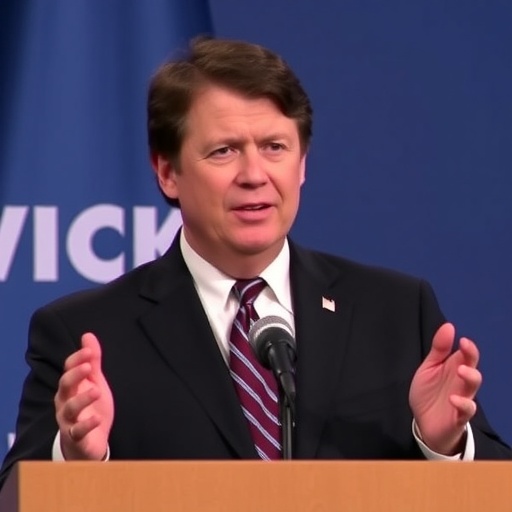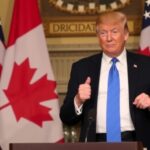Doug Ford Halts Reagan Ad Campaign Amid Trump’s Trade War Threats: Ontario Seeks Path to Resume US Negotiations
In a dramatic pivot aimed at de-escalating bilateral tensions, Ontario Premier Doug Ford has suspended a provocative ad campaign featuring former U.S. President Ronald Reagan’s pro-free trade rhetoric, just hours after President Donald Trump announced the abrupt end to ongoing trade talks between the United States and Canada. The move, announced late yesterday from Queen’s Park in Toronto, underscores the fragile state of Ontario‘s economic ties with its southern neighbor and highlights Ford’s strategic gamble to reopen dialogue with the Trump administration.
- Ford’s Swift Response to Trump’s Ultimatum on Trade Negotiations
- Unpacking the Reagan Ad: A Flashpoint in Ontario’s Free Trade Advocacy
- Trump’s Trade Threats: Echoes of Past Battles in US-Canada Relations
- Economic Ripples: How Ontario Industries Brace for Trade Uncertainty
- Path Forward: Ontario’s Strategy to Revive Stalled Trade Talks with Trump
The Reagan ad, which had been airing across Ontario since last month, invoked Reagan’s 1980s-era speeches to champion open markets and warn against protectionism—messages that critics argued were thinly veiled jabs at Trump’s tariff policies. Ford’s decision to pause the campaign comes as Trump ramps up threats of new tariffs on Canadian goods, potentially crippling key sectors like automotive manufacturing and agriculture in Ontario. With billions in cross-border trade at stake, this development could signal a turning point in the protracted trade talks that have strained relations since the renegotiation of NAFTA into the USMCA.
Ford’s Swift Response to Trump’s Ultimatum on Trade Negotiations
Premier Doug Ford wasted no time in addressing the fallout from Trump’s latest salvo. In a press conference flanked by economic advisors and industry leaders, Ford described the ad pause as a “gesture of goodwill” to foster renewed trade talks. “We’re not in the business of poking the bear when cooler heads could prevail,” Ford stated, referencing the iconic Reagan-era diplomacy that the ads had sought to emulate. The campaign, budgeted at over $2 million and produced by the Ontario government’s economic development arm, was intended to rally public support for free trade principles amid rising U.S. protectionism.
Trump’s decision to halt negotiations, tweeted from the White House late Thursday, cited “unfair Canadian subsidies in dairy and lumber” as the primary sticking points. This echoes earlier disputes during the USMCA talks, where Ontario‘s robust agricultural exports—valued at $4.5 billion annually to the U.S.—faced scrutiny. Ford emphasized that suspending the Reagan ad was not an admission of defeat but a tactical retreat. “Ronald Reagan himself knew when to negotiate from strength, not from slogans,” he added, quoting the late president’s famous line, “Trust but verify.”
Behind the scenes, sources close to the premier’s office reveal that the pause was decided in a hurried cabinet meeting following Trump’s announcement. Advisors reportedly weighed the political risks: continuing the ads could inflame tensions further, while halting them might portray Ford as conciliatory to Washington. The decision aligns with broader Canadian strategy under Prime Minister Justin Trudeau, who has urged provinces to avoid unilateral provocations in federal trade matters.
Unpacking the Reagan Ad: A Flashpoint in Ontario’s Free Trade Advocacy
The Reagan ad campaign burst onto screens and social media with clips of the Gipper extolling the virtues of free enterprise, overlaid with modern imagery of Ontario’s factories and farms. Launched on October 15, it featured Reagan’s 1988 speech to the Canadian Parliament, where he praised the Canada-U.S. Free Trade Agreement as a “beacon of prosperity.” The ads, narrated by a gravelly-voiced actor mimicking Reagan’s cadence, ended with the tagline: “Don’t Let Walls Rise Again—Trade Freely with Our Neighbors.”
Controversy erupted almost immediately. U.S. Ambassador to Canada, Kelly Craft, called the spots “outdated propaganda” during a Toronto appearance, arguing they ignored contemporary issues like intellectual property theft and border security. In Ontario, opposition leaders like NDP’s Andrea Horwath criticized the expenditure as a wasteful distraction from domestic priorities, such as healthcare funding. “While families struggle with rising costs, Doug Ford is playing Hollywood historian,” Horwath quipped in a statement.
Yet, supporters within Ford’s Progressive Conservative party hailed the ads as a bold reminder of shared North American values. Economic data bolsters their case: Bilateral trade between Ontario and the U.S. reached $380 billion in 2022, supporting over 200,000 jobs in the province alone. The campaign’s digital arm garnered 1.2 million views on YouTube within weeks, sparking debates on platforms like Twitter about the relevance of Reagan’s conservatism in today’s polarized climate.
To delve deeper, the ads incorporated statistics from the Ontario Ministry of Finance, highlighting how tariffs imposed by Trump in 2018 cost the province an estimated $1.2 billion in lost exports. One particularly viral spot showed a Windsor auto worker juxtaposed with Reagan’s footage, underscoring the human cost of trade disruptions. Pausing this narrative now leaves a void in public discourse, with Ford promising alternative messaging focused on “quiet diplomacy.”
Trump’s Trade Threats: Echoes of Past Battles in US-Canada Relations
President Trump’s move to end trade talks isn’t isolated; it’s the latest chapter in a saga of economic brinkmanship. Since assuming office in 2017, Trump has repeatedly targeted Canada with tariff threats, from steel and aluminum duties to dairy quotas under the USMCA. His Thursday statement accused Ontario of “dumping subsidized goods” into U.S. markets, a claim refuted by Canadian officials who point to WTO-compliant practices.
Historical context reveals the depth of these frictions. The original NAFTA, signed in 1994, transformed Ontario‘s economy by integrating it with U.S. supply chains—think of the “Big Three” automakers shuttling parts across the Detroit-Windsor border daily. Trump’s renegotiation yielded the USMCA in 2020, but lingering disputes over enforcement persist. Recent data from the U.S. Trade Representative shows a 15% uptick in Canadian imports to the U.S. in 2023, fueling Trump’s narrative of imbalance.
Quotes from Trump’s inner circle amplify the rhetoric. White House trade advisor Peter Navarro, in a Fox News interview, labeled the Reagan ad as “a slap in the face to American workers.” Meanwhile, U.S. senators from border states like Michigan have voiced support for renewed tariffs, citing job losses in their districts. On the Canadian side, International Trade Minister Mary Ng expressed disappointment but optimism, stating, “We remain committed to dialogue, not division.”
The implications extend beyond rhetoric. Analysts from the Conference Board of Canada warn that full-scale tariffs could shave 0.5% off Ontario‘s GDP, hitting manufacturing hardest. With 80% of the province’s exports destined for the U.S., the stakes are existential. Ford’s pause on the ads may buy time, but experts question whether it will sway Trump’s hardline stance.
Economic Ripples: How Ontario Industries Brace for Trade Uncertainty
The suspension of the Reagan ad campaign ripples through Ontario‘s economy, where trade with the U.S. forms the backbone of prosperity. Automotive giants like Ford Motor Company and General Motors, with plants in Oakville and Oshawa, rely on seamless cross-border flows. A 2019 study by the Auto Alliance estimated that disruptions could idle 50,000 jobs overnight.
Agriculture faces similar perils. Ontario’s dairy sector, a point of contention in USMCA talks, exports $500 million worth of products annually to the U.S. Trump’s threats target these “supply management” systems, which limit imports to protect local farmers. In a letter to federal counterparts, Ontario Milk Producers Association president Ralph Ost caused alarm: “Any escalation would devastate our 5,000 family farms.”
Lumber, another flashpoint, saw U.S. duties in 2017 that cost the industry $200 million. With softwood exports from northern Ontario forests at risk, companies like West Fraser Timber are stockpiling inventory and lobbying for exemptions. Broader stats paint a dire picture: The Canadian Chamber of Commerce reports that 25% of small businesses in the province have already felt the pinch from previous tariffs, with many citing increased costs passed to consumers.
To mitigate, Ford’s government is exploring diversification. Initiatives include bolstering ties with the EU via CETA and investing $300 million in supply chain resilience. Interviews with business leaders, such as Unifor union head Jerry Diaz, reveal mixed sentiments: “Pausing the ads is smart, but we need real concessions from Trump, not just gestures.”
Consumer impacts loom large too. Higher tariffs could inflate prices for everything from cars to maple syrup, squeezing household budgets amid inflation rates hovering at 3.8%. Economists at the University of Toronto forecast a potential 2-3% rise in grocery costs if talks collapse entirely.
Path Forward: Ontario’s Strategy to Revive Stalled Trade Talks with Trump
As Doug Ford navigates this diplomatic minefield, eyes turn to potential next steps in resurrecting trade talks. The premier has scheduled virtual meetings with U.S. governors from key states like New York and Michigan, leveraging personal ties to bypass federal gridlock. “Province-to-state diplomacy has worked before,” Ford noted, alluding to successful subnational pacts on energy and environment.
Federal involvement is crucial. Ottawa has signaled willingness to host a trilateral summit, possibly in Ottawa next month, to address Trump’s grievances. Premier Ford’s office hints at concessions, such as enhanced border security measures or joint investments in critical minerals—Ontario boasts vast reserves of nickel and cobalt essential for EV batteries.
Optimism tempers caution. Pollster Frank Graves of EKOS Research suggests public support in both countries for reconciliation: 62% of Canadians and 55% of Americans favor deeper integration. Yet, with midterm elections looming in the U.S., Trump’s posturing may intensify.
Looking ahead, the ad pause could evolve into a broader media strategy emphasizing collaboration. Ford’s team is consulting with ad firms on low-key campaigns highlighting mutual benefits, like shared COVID-19 vaccine production during the pandemic. If successful, this could pave the way for a USMCA review clause activation in 2026, ensuring long-term stability.
Ultimately, the saga of the Reagan ad and Trump’s threats illustrates the interdependence binding Ontario and the U.S. As negotiations hang in the balance, stakeholders from Toronto to Washington brace for outcomes that could redefine North American commerce for years to come.








